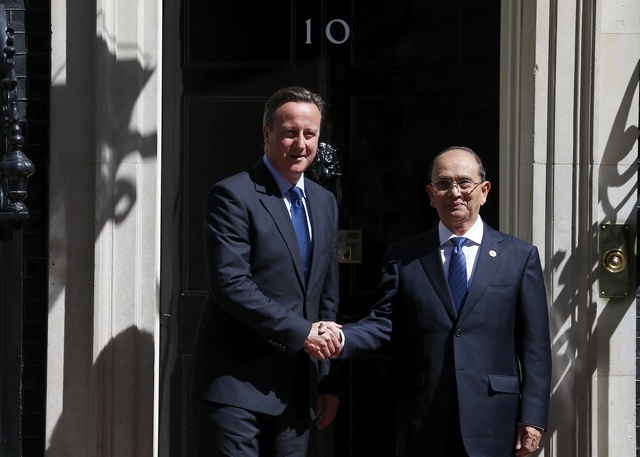The British government has denied breaching the EU arms embargo for Burma, after a parliamentary report revealed that it has eight active arms export licences for the former military dictatorship.
A spokesperson for the UK embassy in Rangoon told DVB that the vast majority of licences were for commercial application of “dual-use” goods, including software for civil aircraft and equipment for an offshore oil and gas company. The one licence intended for military goods – namely bomb suits and devices for detonating explosives – was for use by a humanitarian agency engaged in land mine clearance.
“The UK government takes its export responsibilities very seriously – we have one of the most rigorous armed export control regimes in the world and we are very much party to the EU ban on Burma and that policy is still very much in place,” said Joe Fisher, Second Secretary of the British Embassy in Rangoon. “We’ve granted these licenses on the basis that they’ve passed our strict criteria.”
He added that a request to export small arms ammunition, which was denied in May 2011 on the basis that it breached the EU’s embargo, was for .22 calibre sporting cartridges intended for a local shooting association. However, the British embassy refused to disclose the name of the exporter due to “commercial sensitive reasons”.
The UK has also conceded that there is a risk that illicit trade into Burma could increase in tandem with the rise in legitimate exports to the former pariah, which has been stripped of most international economic and trade sanctions since reformist President Thein Sein took office in 2011.
“With the increase in trade – which is a welcome thing in terms of developing Burma’s prosperity – we need to make sure, in conjunction with partners here in country, that what is traded is in line with legal requirements,” said Fisher.
Britain has continued to step up diplomatic and economic ties with Burma, which is slowly emerging from five decades of military rule, despite ongoing concerns about human rights.
A historic visit by President Thein Sein to Britain this month was largely overshadowed by Burma’s treatment of ethnic minorities, including the Muslim Rohingya, who are denied citizenship and heavily persecuted. Despite appeals by Prime Minister David Cameron to address their citizenship, Thein Sein has reiterated his government’s commitment to a controversial 1982 law, which renders them stateless.
Human rights groups say the British government has lost its bargaining power by prematurely shedding sanctions and rekindling a military relationship with the quasi-civilian regime.
It follows news that the British government has offered training to the Burmese army, although Fisher insists that collaboration will focus on human rights and accountability. Both Burma and Britain are set to establish defence attachés in Rangoon and London respectively in the near future.
“While the arms export licenses allowed so far do not appear to be cause for significant concern, the steps by the British government to move closer to the Burmese military are very worrying,” said Mark Farmaner, Campaign Director of Burma Campaign UK.
“We were originally told military to military contacts would be purely diplomatic, but already it has been expanded to include training. Given the recent record of the British government, it wouldn’t surprise us if they supported lifting the arms embargo when it’s due for renewal next April.”
Burma has been subject to an EU arms embargo since 1996 as a result of the former military regime’s persistent violations of human rights, including military attacks and abuses against civilians in ethnic minority regions.



